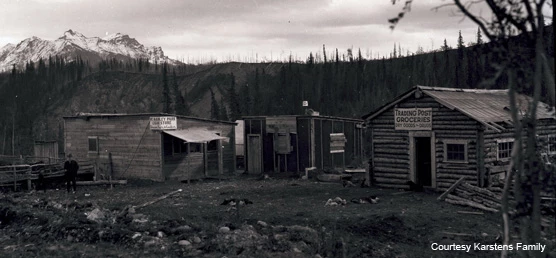
Henry P. Karstens Collection, 0294, Karstens Library 
You are now standing near the northwest corner of Maurice Morino’s original roadhouse, built in a wide clearing overlooking Riley Creek. Imagine the isolation when he built his cabin here in 1914. There was no road, no railroad, no easy overland trail. The Nenana River was unfit for navigation due to its thunderous rapids and steep-walled gorge. But if Morino felt isolated here in those early days, the mood most certainly was broken as cabins and shacks known collectively as "The Hole" sprang up nearby. The area below the bridge at the junction of two trails was off limits to the children of McKinley Station. Illicit traits of the "Roaring 20s" — bootlegging, alcohol manufacturing, gambling, violence, and prostitution — were centered here. U.S. Marshals made frequent raids, arresting distillers, madams, and their customers. Once bridge construction ended and the labor force drained away, many who had come to relieve workers of their pay moved on as well. 
Clustered here on land adjoining Morino’s original cabin site were three businesses – Donnelly's Restaurant, Mary Thompson’s Trading Post, and the McKinley Park Cigar Store. In the 1920s "cigar stores," besides selling tobacco, were often contact points for prostitution, gambling and illegal liquor sales. Downstream a short distance was the cabin of John Coddy, a professional gold rush-era gambler. Thompson’s Trading Post was previously run by Klondike veteran Jack Cronin who operated it as a store and "amusement place." His cabin, built by railroad workers in 1922, featured gambling, drinking, and other activities. When Cronin died in February 1923, Mary Murphy Thompson turned it into a trading post with an expanded inventory. She also did laundry and outfitted guided trips into the park and surrounding areas. Thompson came north with her husband and young son in 1913. After the birth of a daughter, and the death of her husband, she relocated to McKinley Station in 1922. Five years later, she sold out and moved to Suntrana near the Healy coalmines, where she opened another roadhouse and store catering to mine workers. She raised goats on her 15-acre "goat ranch" and earned the nickname, "Goat Mary." Other small buildings dotted the large clearing. Stilt-legged caches kept fresh meat and supplies safe from roving animals. Fresh produce from two or three gardens supplemented purchased supplies. Chained sled dogs howled from the tops of doghouses. A team of horses required the owner to cut and dry summer grass for late season forage. The work was endless. As they aged, many of these jaded pioneers knew their chances of striking it rich were long gone. Given the isolation and limited economic opportunities of McKinley Station, the handful of people who settled here may have grown tired of following one boom to the next, and simply stayed for the comfort of the known. 
NEXT STOP 
PREVIOUS STOP |
Last updated: April 14, 2015

